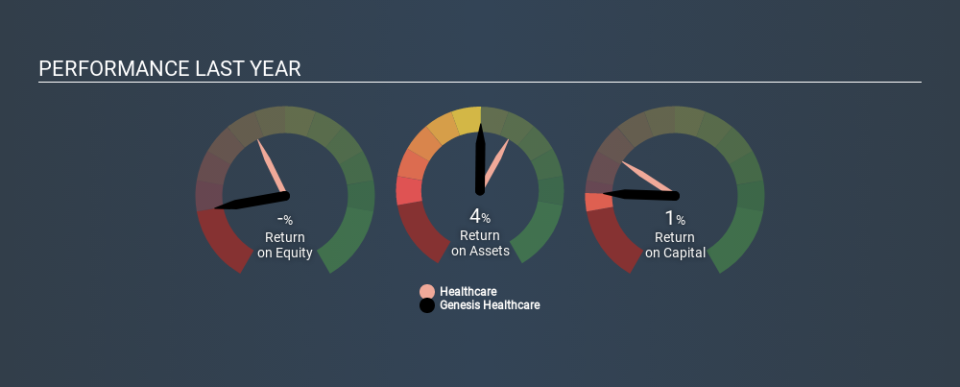Is Genesis Healthcare, Inc. (NYSE:GEN) Investing Your Capital Efficiently?

Today we are going to look at Genesis Healthcare, Inc. (NYSE:GEN) to see whether it might be an attractive investment prospect. Specifically, we're going to calculate its Return On Capital Employed (ROCE), in the hopes of getting some insight into the business.
First up, we'll look at what ROCE is and how we calculate it. Then we'll compare its ROCE to similar companies. And finally, we'll look at how its current liabilities are impacting its ROCE.
Understanding Return On Capital Employed (ROCE)
ROCE is a measure of a company's yearly pre-tax profit (its return), relative to the capital employed in the business. All else being equal, a better business will have a higher ROCE. Overall, it is a valuable metric that has its flaws. Renowned investment researcher Michael Mauboussin has suggested that a high ROCE can indicate that 'one dollar invested in the company generates value of more than one dollar'.
How Do You Calculate Return On Capital Employed?
The formula for calculating the return on capital employed is:
Return on Capital Employed = Earnings Before Interest and Tax (EBIT) ÷ (Total Assets - Current Liabilities)
Or for Genesis Healthcare:
0.014 = US$51m ÷ (US$4.7b - US$1.1b) (Based on the trailing twelve months to December 2019.)
So, Genesis Healthcare has an ROCE of 1.4%.
View our latest analysis for Genesis Healthcare
Is Genesis Healthcare's ROCE Good?
ROCE can be useful when making comparisons, such as between similar companies. We can see Genesis Healthcare's ROCE is meaningfully below the Healthcare industry average of 10%. This performance could be negative if sustained, as it suggests the business may underperform its industry. Independently of how Genesis Healthcare compares to its industry, its ROCE in absolute terms is low; especially compared to the ~1.7% available in government bonds. It is likely that there are more attractive prospects out there.
Genesis Healthcare's current ROCE of 1.4% is lower than its ROCE in the past, which was 5.2%, 3 years ago. Therefore we wonder if the company is facing new headwinds. You can see in the image below how Genesis Healthcare's ROCE compares to its industry. Click to see more on past growth.
It is important to remember that ROCE shows past performance, and is not necessarily predictive. ROCE can be misleading for companies in cyclical industries, with returns looking impressive during the boom times, but very weak during the busts. ROCE is, after all, simply a snap shot of a single year. Future performance is what matters, and you can see analyst predictions in our free report on analyst forecasts for the company.
Do Genesis Healthcare's Current Liabilities Skew Its ROCE?
Liabilities, such as supplier bills and bank overdrafts, are referred to as current liabilities if they need to be paid within 12 months. Due to the way the ROCE equation works, having large bills due in the near term can make it look as though a company has less capital employed, and thus a higher ROCE than usual. To counteract this, we check if a company has high current liabilities, relative to its total assets.
Genesis Healthcare has current liabilities of US$1.1b and total assets of US$4.7b. Therefore its current liabilities are equivalent to approximately 23% of its total assets. This is a modest level of current liabilities, which will have a limited impact on the ROCE.
The Bottom Line On Genesis Healthcare's ROCE
That's not a bad thing, however Genesis Healthcare has a weak ROCE and may not be an attractive investment. But note: make sure you look for a great company, not just the first idea you come across. So take a peek at this free list of interesting companies with strong recent earnings growth (and a P/E ratio below 20).
For those who like to find winning investments this free list of growing companies with recent insider purchasing, could be just the ticket.
If you spot an error that warrants correction, please contact the editor at editorial-team@simplywallst.com. This article by Simply Wall St is general in nature. It does not constitute a recommendation to buy or sell any stock, and does not take account of your objectives, or your financial situation. Simply Wall St has no position in the stocks mentioned.
We aim to bring you long-term focused research analysis driven by fundamental data. Note that our analysis may not factor in the latest price-sensitive company announcements or qualitative material. Thank you for reading.

